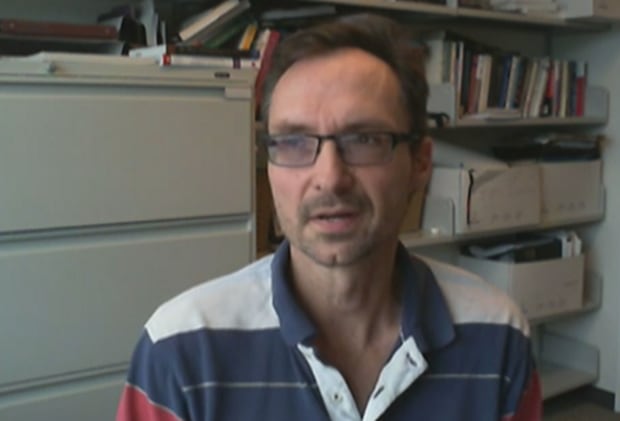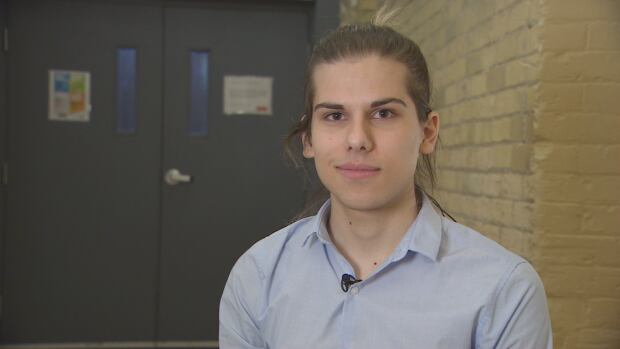Asexual Community Calls for Understanding and Support
Kiana Jaymes is used to explaining what her sexual orientation means.
There’s a lot of information out there about being gay, bisexual or transgender, she says, but fewer people know what it means to be asexual, which is how she identifies.
“I feel like I’ve heard or seen conversations online and people think that asexuality is [when] you are born without genitals or things of that nature. There really isn’t knowledge,” Jaymes said.
- The Current: Asexuality a sexual orientation, not a disorder
The 37-year-old Winnipegger said when she tells people she is asexual they will ask her if it is from medications or related to childhood abuse.
“You would not say that to somebody who is gay,” she said.
“That would be so insulting to someone and it really is to [me] because it’s … not a choice. It’s not a behaviour pattern that happens as a result of something.”
1% of population asexual, research says
People who are asexual have no sexual desire or have sexual desire but don’t connect it to other people, according to Brock University professor Anthony Bogaert.
Bogaert studies human sexuality, including sexual orientation and asexuality, and wrote the book Understanding Asexuality.
In a study in 2004, Bogaert surveyed people in different communities around the world, and about one per cent of respondents identified as asexual or reported no sexual attraction for others. He said there is also evidence that more women than men are asexual.
“It’s probably something that people recognize early on in life. Probably as an adolescent they recognize themselves as different than others,” he said.

Anthony Bogaert is a professor at Brock University who studies human sexuality, including sexual orientation and asexuality. (CBC)
Asexuality was once considered a psychiatric disorder but Bogaert said his research suggests it’s biological.
“We think that there’s probably a prenatal, or prior to birth, explanation that gives people a disposition to be asexual,” he said.
Throughout history, there have been people recognized as asexual but it’s still a new frontier when it comes to research, Bogaert said. That means there are a lot of false assumptions attached.
“We need to be sensitive to the fact that just because someone is a sexual minority and different … this should not necessarily be construed as a disorder,” he said.
“Lack of sexual attraction doesn’t mean a lack of romantic attraction.”
‘Like an out-of-body type thing’
Jaymes was in her late 20s when she found the name for the lack of sexual attraction she had felt her whole life.
“I had maybe two relationships in my entire life and I had never felt that desire to … initiate a sexual intimacy with my partner,” she said.
“It felt foreign to me, like an out-of-body type thing.”
- Day 6: Asexuals fight for recognition
She would chose partners who might not notice her lack of intimacy. Her first boyfriend was gay and her longest relationship was with a man with an alcohol problem, she said.
“It helped me to kind of not have to talk about things but they could still be that companion that I needed. That other intimacy without the sexual part,” she said.
“I made choices so I wouldn’t have to face it. Maybe that was cowardly or maybe that was protecting myself so I would not have to think about it.”
One day, Jaymes was taking an online quiz about sexual orientation and first saw the term asexual. It instantly connected with her and she tried to find more information, but says it wasn’t easy.
Instead, Jaymes decided to put it out of her mind and keep trying to date people.
“It led to a lot of unhappiness in relationships,” she said.
‘Won’t believe it’s something that is real’
There needs to be increased awareness around what asexuality is, says Brian Langevin, executive director at the Toronto-based organization Asexual Outreach.
“Most asexual people, because they don’t always have access to the word ‘asexual’ or haven’t heard it before, they can feel very broken, feel like there is something wrong with them because they don’t have an identity to identify with,” he said.
Even when a person identifies as asexual, the “coming out” process can mean a long conversation just to explain what asexuality means, Langevin added.

Brian Langevin, executive director at the Toronto-based organization Asexual Outreach, says the ‘coming out’ process for people who are asexual can be complicated. (CBC)
“People won’t legitimize that identity. People won’t believe that it’s something that is real. So there can be a whole lot of invalidation there,” he said.
While there might not be the sort of clear prejudices members of the LGBT community face, Langevin said “there is this general norm within society that everyone is or should be having sex, or should be aspiring to have sex.
“If they are not, [people think] there is something wrong with them,” he said.
- Steinbach prejudice and Pride among key moments of 2016 for Manitoba LGBT community
Asexual Outreach works as an umbrella organization for the broader asexual movement in Canada. While there is online outreach, Langevin said asexual people in smaller cities and rural areas don’t have enough of a support network. That can leave people, particularly youth, at risk of bullying and mental health issues, he added.
“[We need to] connect our efforts across the country but also be able to support people regardless of whether they are in a town of 5,000 or five million,” he said.
Jaymes said she wishes there had been more awareness and support as she struggled to understand her identity while growing up.
- LGBTQ acronym an ever-growing shortcut for hugely diverse community
Though she is happy to have connected with the asexual community, she said society more broadly needs to recognize that she can still love and have a relationship.
“It’s something I think you are born as. It’s not a choice. It’s not a result of something happening to you,” she said.
“You can be loved and you are a loving person, you just love in a different way. It’s not based on sex, it’s based on the personality of that person. In a way, I think that might be a more lasting love.”